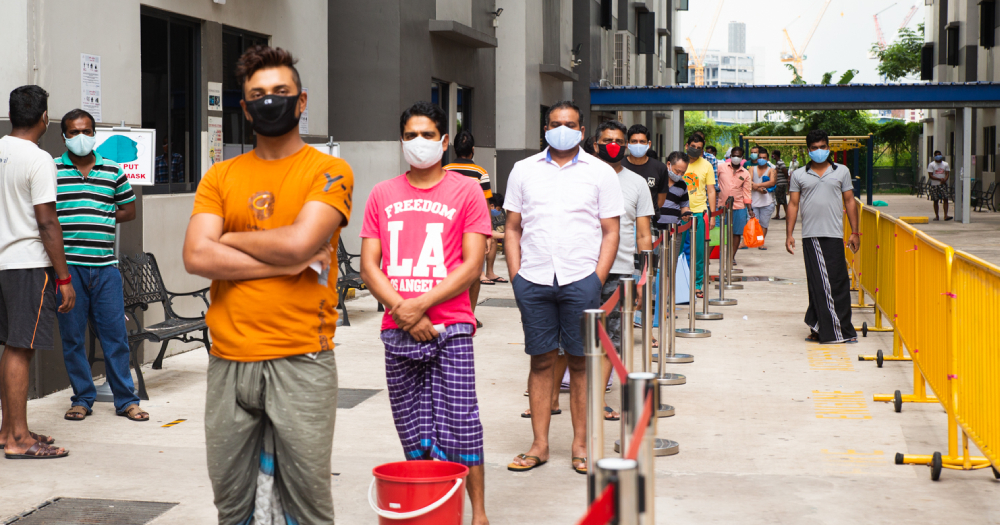At around 11am on April 5, foreign worker dormitory manager Vasudavan Krishnan received several visitors at Westlite Toh Guan.
“MOM (Ministry of Manpower) officers came,” he told me over a Zoom call.
“They said they’re going to lockdown (the dormitory) at two o’clock.”
It triggered three “really really rush” hours as the 51-year-old and his team scrambled to pull together the administrative and practical requirements for such a simply-expressed yet tremendously grave decree.
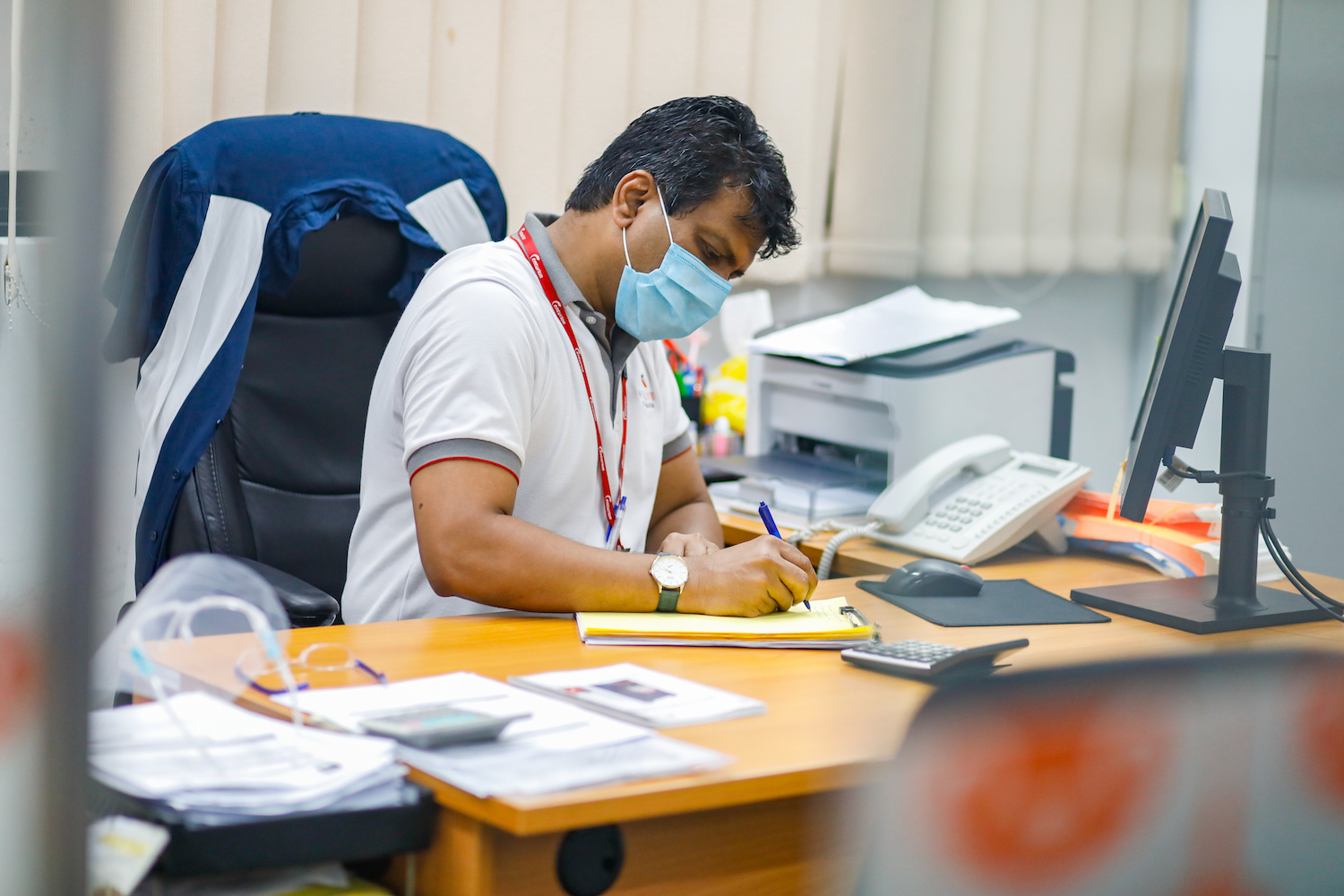 Vasudavan Krishnan, dormitory manager of Westlite Toh Guan. Image courtesy of MOM
Vasudavan Krishnan, dormitory manager of Westlite Toh Guan. Image courtesy of MOM
Among other things, MOM needed a list of the dormitory’s 6,800 residents' names, as well as some of their biographical data, and floor plans for Westlite Toh Guan’s buildings and units.
At 2pm exactly, the main gate to the dormitory slammed shut and Westlite Toh Guan, along with S11 Dormitory @ Punggol, became the first two dormitories in Singapore to be gazetted by MOM as isolation areas.
“Those who left to work, when they returned, they will not be allowed to come back. Those who were inside, we didn't allow them out.”
The measure was announced later that evening by Minister for Manpower Josephine Teo, signalling a real turn in Singapore’s fight against Covid-19.
Since then, the pandemic’s ravaging of the nation’s foreign worker population has dominated the media and public discourse. Each day, reports of newly uncovered Covid-19 cases showed that the vast majority of infections were among foreign workers living in dormitories here.
On April 5, Westlite Toh Guan and S11 Dormitory @ Punggol — the most affected of Singapore’s 43 foreign worker dormitories — had been linked to 63 cases in total.
And as of May 29, 31,603 — or 93 per cent — of the country’s Covid-19 cases have been found among foreign worker dormitory residents.
Bypassing initial precautions
It all developed in a way Vasudavan could never have imagined.
Centurion Corporation — which operates five foreign worker dormitories in Singapore including Westlite Toh Guan — began implementing health precautions in January 2020, as news of a fast spreading virus filtered out of China.
Temperature-taking exercises were carried out and by the middle of January, the dormitory had set up isolation and quarantine rooms for workers who were returning to Singapore from overseas. Soon, thermal scanners were installed at the entrance of Westlite Toh Guan.
Yet the virus, it was eventually discovered, can be spread by unsuspecting asymptomatic carriers.
Vasudavan remembered his surprise at the first discovery of a Covid-19 infection at Westlite Toh Guan, days before it were set to be gazetted as an isolation area.
“This resident looked very fit — no symptoms — but he was positive.
I still remember this guy — one of my good buddies, I can say that. He’s always giving us feedback on what’s going on in the dormitory or in the unit.”
By the time the doors to the dormitory were ordered shut by the government, Vasudavan said the overwhelming feelings among the residents were of anxiety over the virus.
Lacking manpower for security in the dormitories
B. Panneerselvam, 51, a security executive at Centurion who has three of the company’s foreign worker dormitories (Westlite Woodlands, Westlite Mandai and Westlite Juniper) under his purview, said these feelings were shared by dormitory staff.
“You cannot tell who is infected with Covid-19, so that adds on to (our) fear and worry.”
It led a number of the security team’s contracted staff to call it quits; they were no longer willing to work at the virus hotspots. Coupled with the need to redeploy older security personnel to less risky roles, this put an intense manpower resource strain on a department that was already stretched by the virus.
Before the pandemic, security mainly monitored the entrances and exits of the dormitories and maintained the orderliness of its residents.
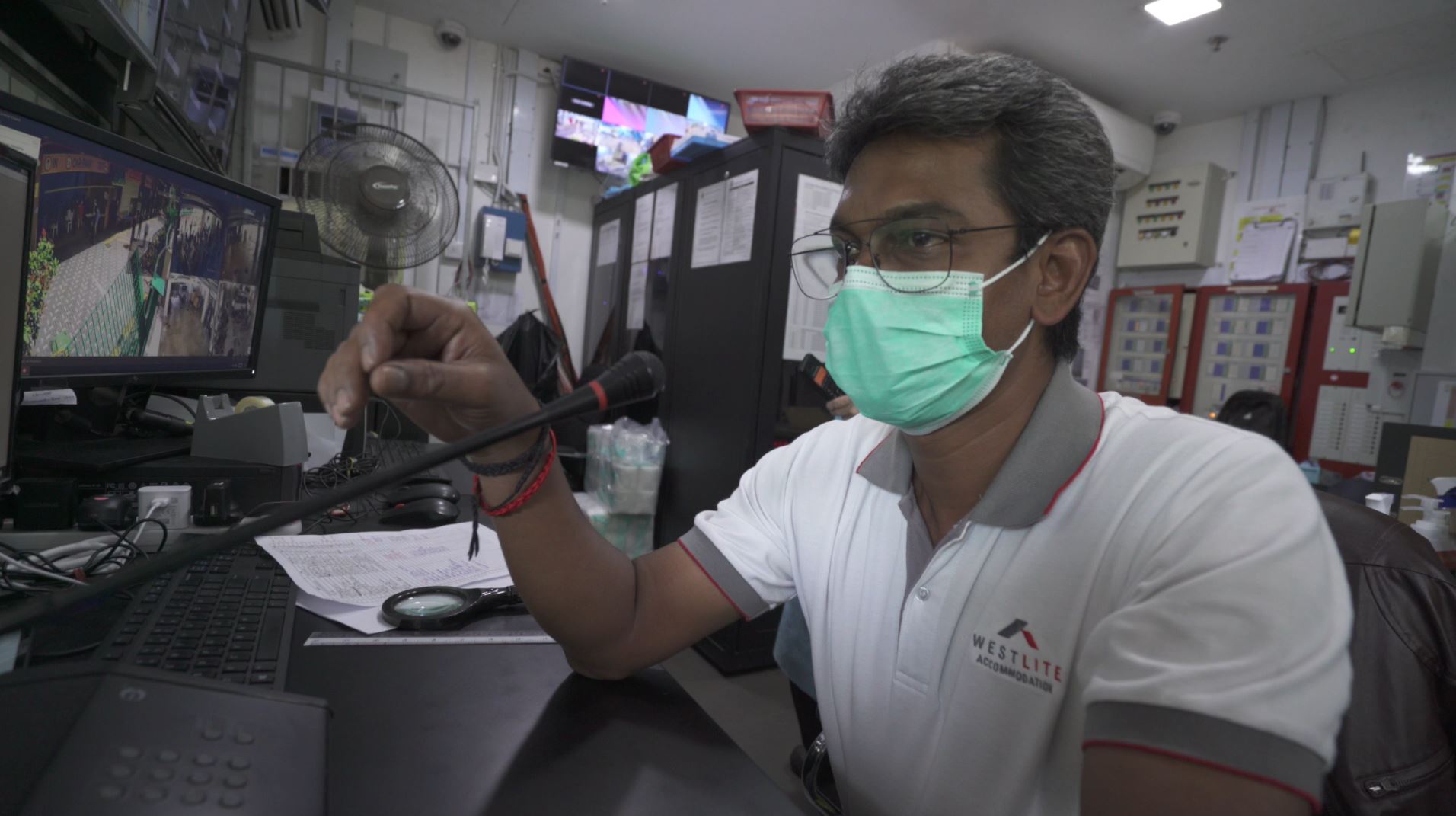 B. Panneerselvam, security executive for Westlite Woodlands, Mandai, and Juniper. Image courtesy of Centurion
B. Panneerselvam, security executive for Westlite Woodlands, Mandai, and Juniper. Image courtesy of Centurion
But while only one of the three dormitories Panneerselvam oversees — Westlite Mandai — has been gazetted as an isolation area, Centurion has implemented “self-isolation” at the others in their effort to curb the spread.
This means that nowadays, Panneerselvam’s team plays an integral role in ensuring that safe distance measures and isolation protocols are followed at all three.
Residents are now required to stay in their rooms for most of the day; activities that they would have been used to doing at their own leisure such as remittance transfers or purchasing groceries must now adhere to strict staggered timings.
“My security guys, being the frontline, I think they take the first blow from the residents,” he said.
“I will say its quite a challenge for us, because we are turning (the residents’) normalcy into isolation. It’s not easy for them to accept you see.”
Dealing with disgruntled employers and social media
Dormitory staff have also had to deal with the disgruntled employers of their residents. Vasudavan said his team was met with resistance when they tried to set up a block for recovered workers living at Westlite Toh Guan.
The need to establish separate blocks for recovered workers is part of the government's plan to keep dormitory residents who are healthy away from those who may still be infected.
In order to optimise the space available to them, management at the dormitory decided that units — which usually house up to 12 residents each — that had vacancies and were already occupied by foreign workers cleared of the virus would double up to house workers returning after receiving treatment for Covid-19.
This would include housing together residents cleared of the virus but who work for different companies. Normally, foreign workers who are employed by the same company stay together.
Vasudavan said his staff were sometimes on the receiving end of “scoldings” from employers who were unhappy about their employees being exposed to other workers.
“The employer must understand that we are creating this block (for their good). It is so we can release their workers (back to work) as soon as possible.”
Adding to the pressure Vasudavan had been feeling were the images of squalid living quarters and reports of unhygienic conditions that emerged from his dormitory days after it was first gazetted as an isolation area.
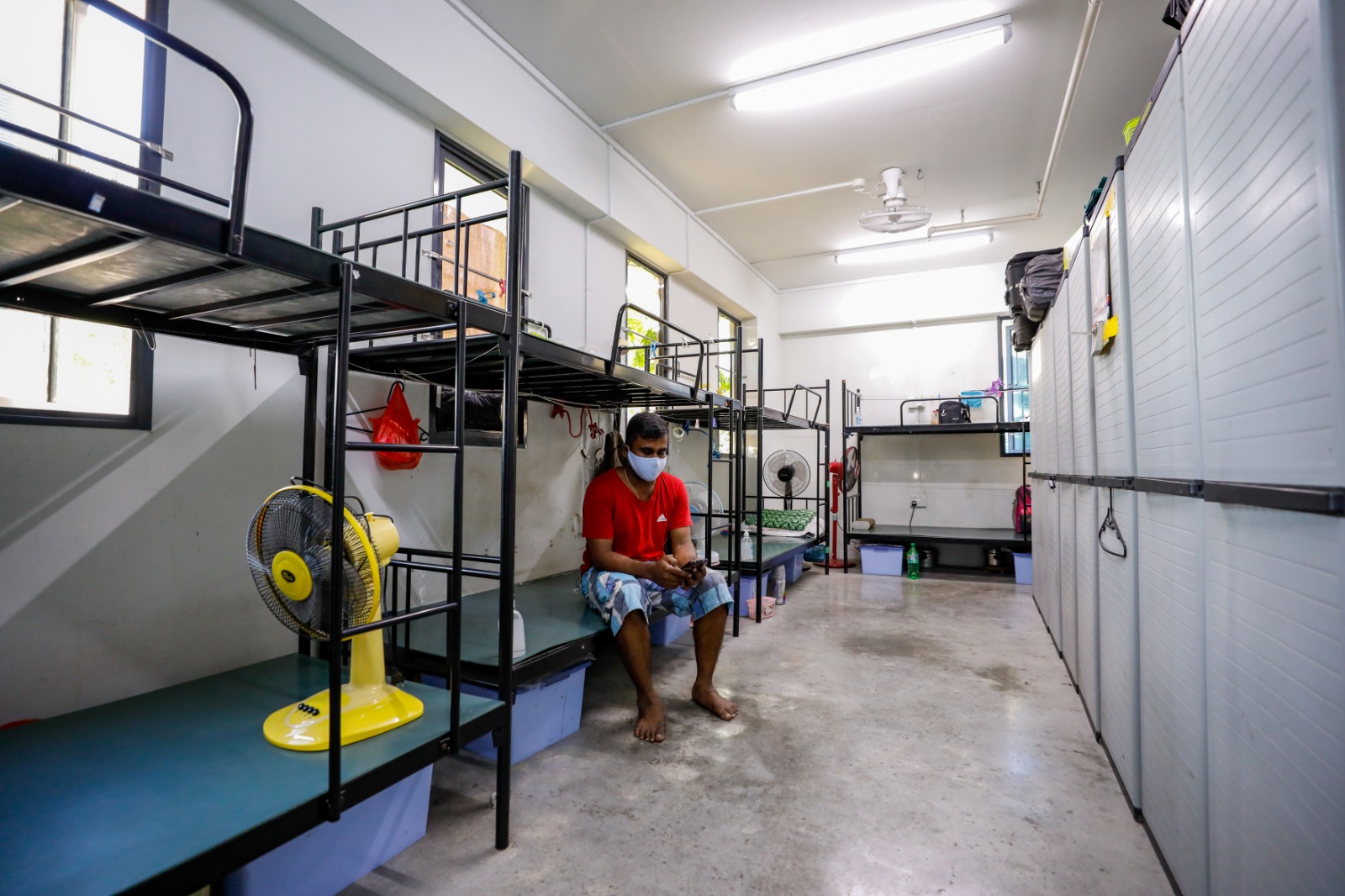 Not these, though. Image courtesy of MOM
Not these, though. Image courtesy of MOM
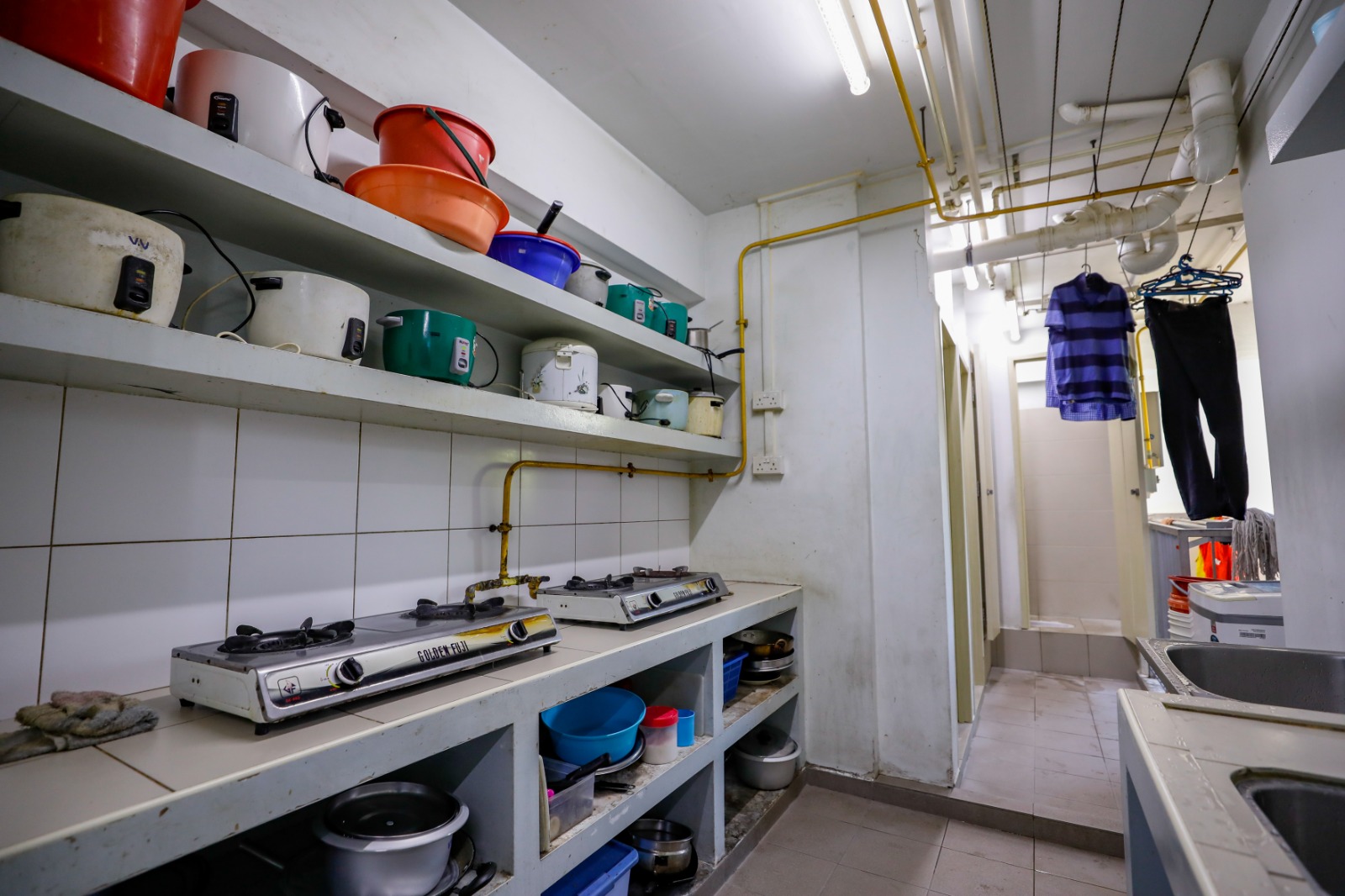 Image courtesy of MOM
Image courtesy of MOM
Similar pictures and videos were emerging from both Westlite and S11, the latter of which the following article is focused on:
While most of the images and complaints centred on S11 Dormitory @ Punggol, it seemed that little differentiation between dormitory operators existed in the minds of the public when it came to levelling criticism.
When I asked Vasudavan about the images, and what he thought about it, the dormitory manager explained that while cleaners are hired at Westlite Toh Guan, they are only responsible for the common areas.
Each unit itself, which includes a kitchen, dining area, and bathroom, is supposed to be kept clean by the residents themselves.
“Before Covid-19, every 14 days we conduct a room inspection. We ensure that the residents do the cleaning.”
For units not kept up to standard, dormitory staff write to the residents’ employers with photos of what needs to be improved. Three days are then given to the residents to rectify the issues, before dormitory staff go in and do the cleaning themselves, charging residents for the cleaning service in the process.
But as with everything else in this period, the pandemic has disrupted this process as dormitory staff can no longer enter the units. Instead, these days Vasudavan and his team have been conducting virtual inspections, getting residents to video call dormitory staff and show them around the room.
To incentivise the workers, Westlite Toh Guan introduced a S$200 prize for the cleanest rooms, most recently giving the reward to 10 different units.
It’s an example of the improvisation dormitory staff have had to undertake as they continue working in trying circumstances.
"It was very terrible, very challenging"
Suriyanti Binti Mohamed Fathel, a customer service officer at Westlite Toh Guan, described the first days of adjusting to working in an isolation area as “very jialat”.
The need for increased manpower on the ground saw the 42-year-old helping to execute the logistics of the dormitory’s lockdown. This included handing out meals, assisting in cash withdrawals, and distributing groceries.
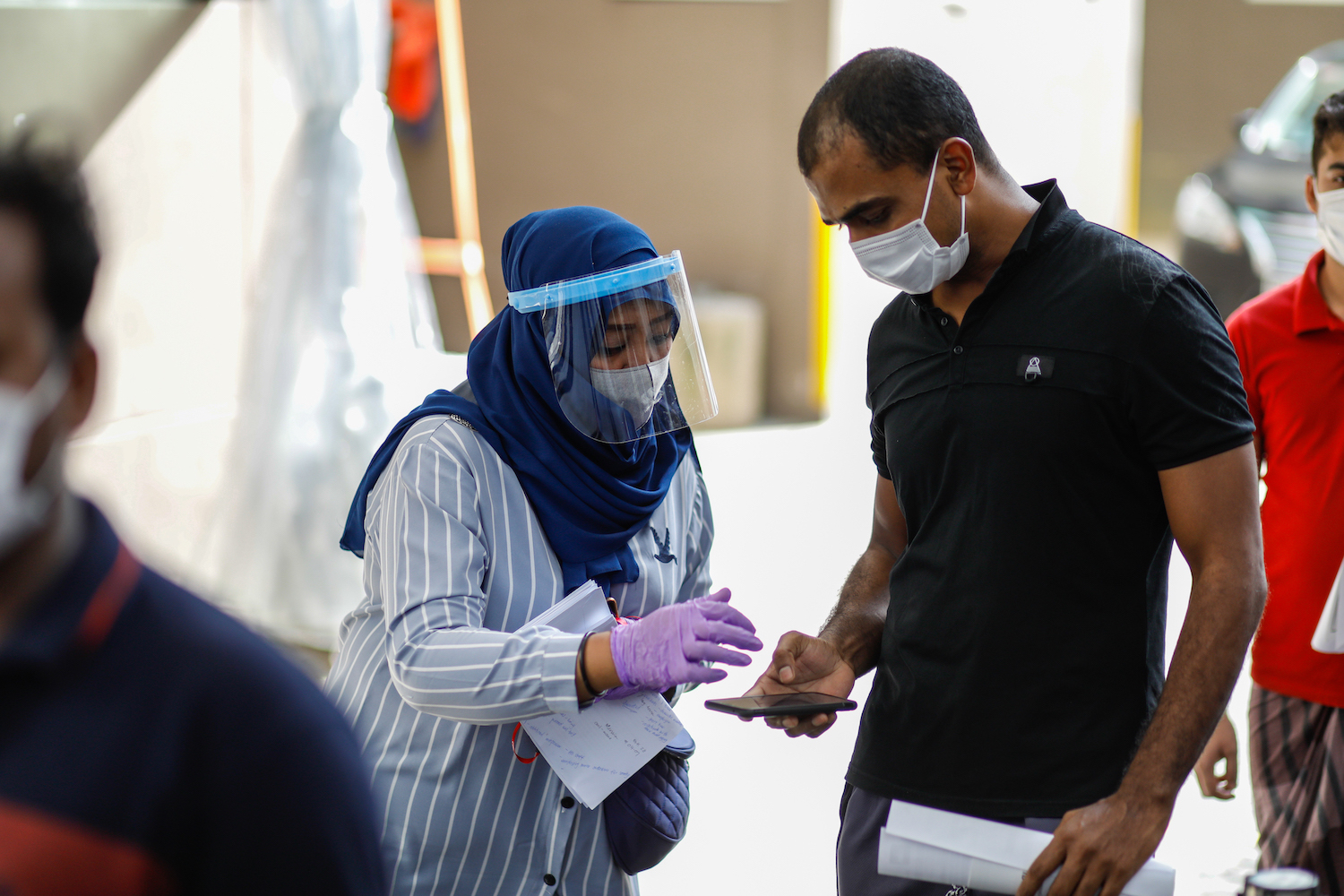 Suriyanti Binti Mohamed Fathel (L), customer service officer at Westlite Toh Guan. Image courtesy of MOM
Suriyanti Binti Mohamed Fathel (L), customer service officer at Westlite Toh Guan. Image courtesy of MOM
Figuring out the safest and most efficient way to get food to the workers, she said proved a nightmare in beginning.
“It was very terrible, very challenging,” she said, also admitting that they experienced teething problems with their caterers as everyone struggled to come to grips with the cultural necessities of the residents.
Figuring out how to work within safe distancing requirements dragged the process of distribution out longer; residents had to bear with staggered collection timings, with representatives coming down from the unit to pick up the meals for the rest of their roommates.
It resulted in long waiting times for workers, and created anxiety that there would not be enough food.
Through trial and error, Suriyanti and her colleagues eventually refined and smoothed out the process. Over time, as they became more familiar with the process, the time taken to distribute food become shorter and shorter.
Vasudavan told me that managers from Centurion's five dormitories conduct regular meetings where information on what processes work well (or don't) is shared. The collective pool of knowledge helps to flatten the learning curve across the company's dormitories.
At Centurion's ASPRI-Westlite Papan dormitory, where I got to observe the collection of lunch, about 4,500 residents were able to collect their food within 40 minutes.
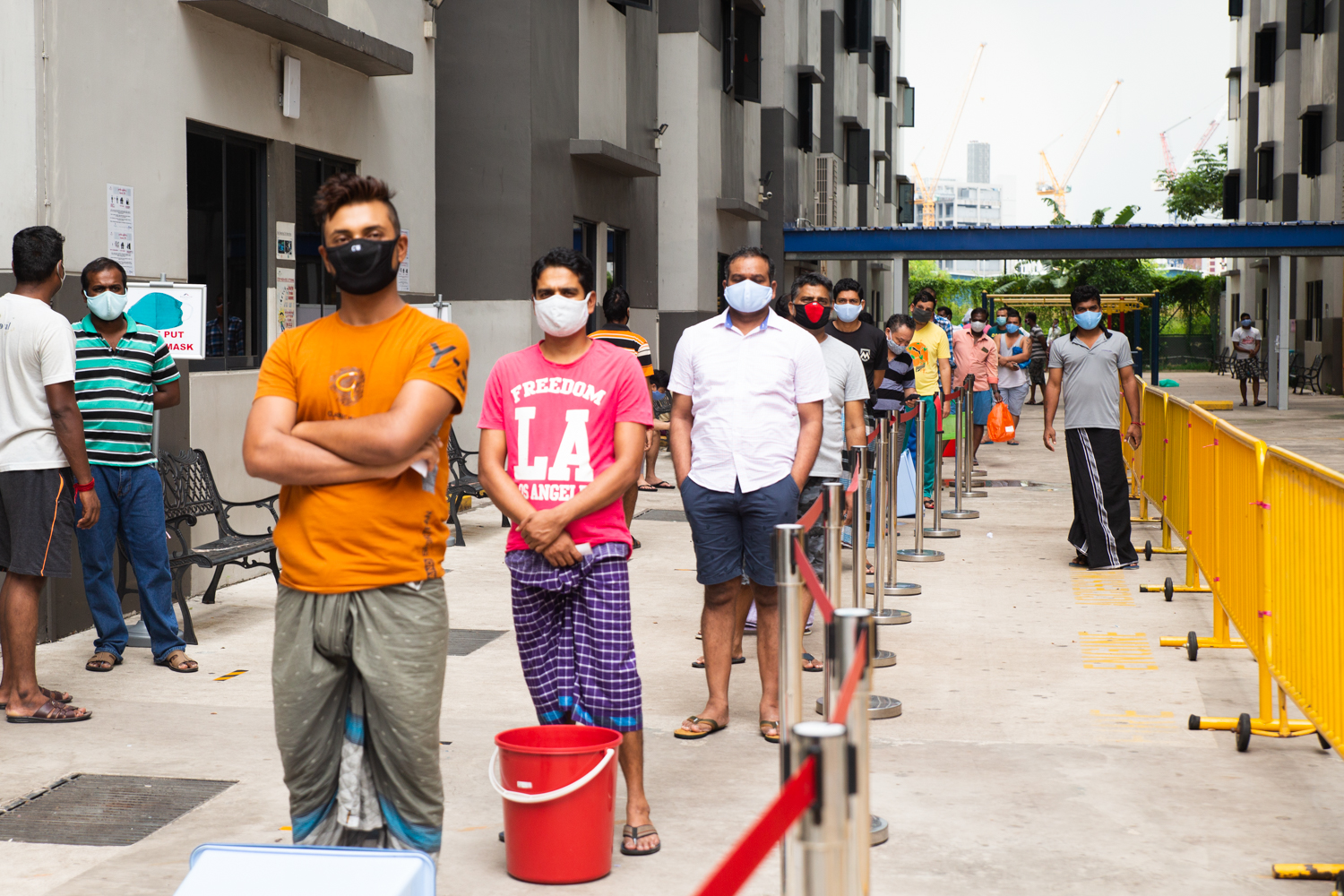 Image by Andrew Koay
Image by Andrew Koay
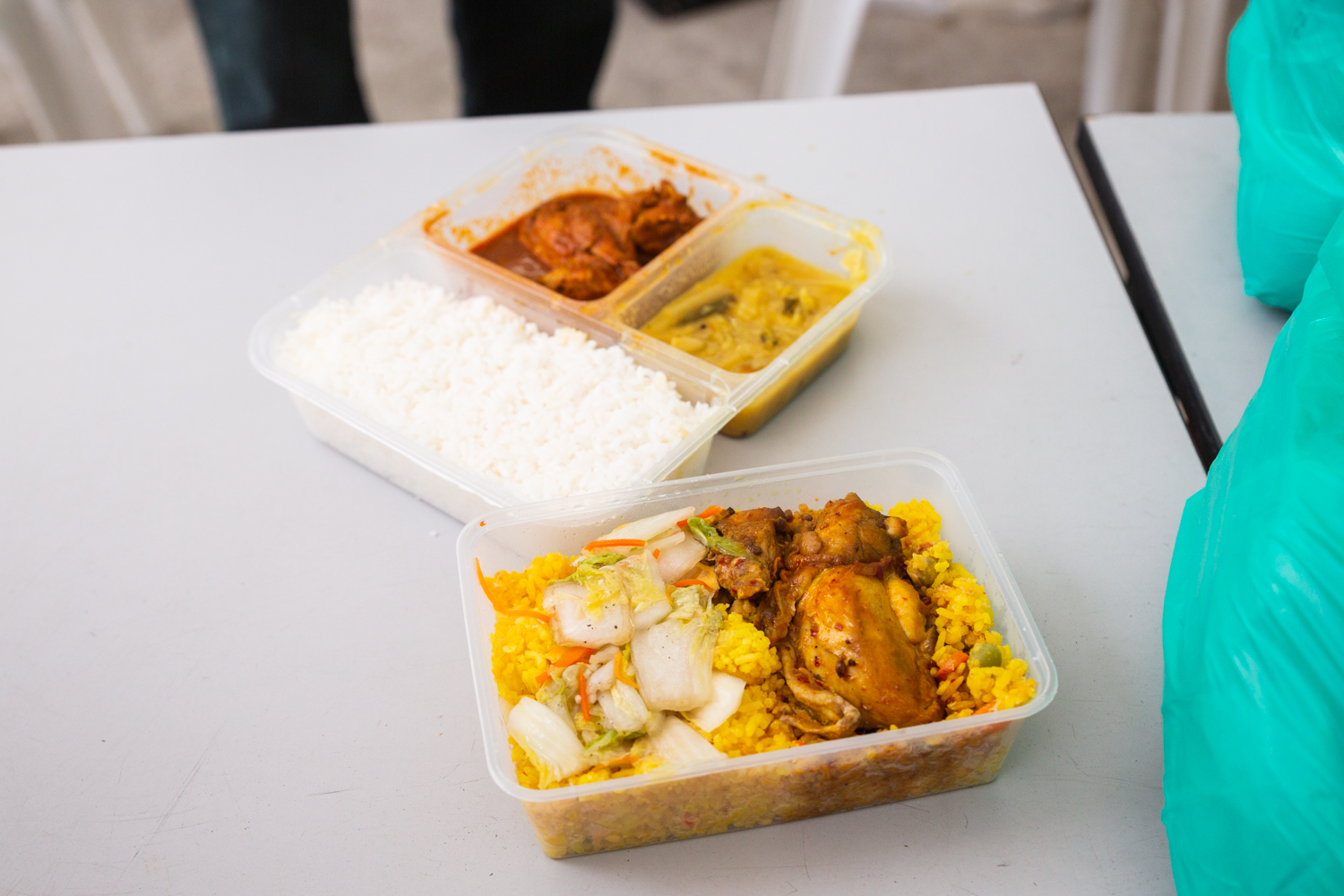 Image by Andrew Koay
Image by Andrew Koay
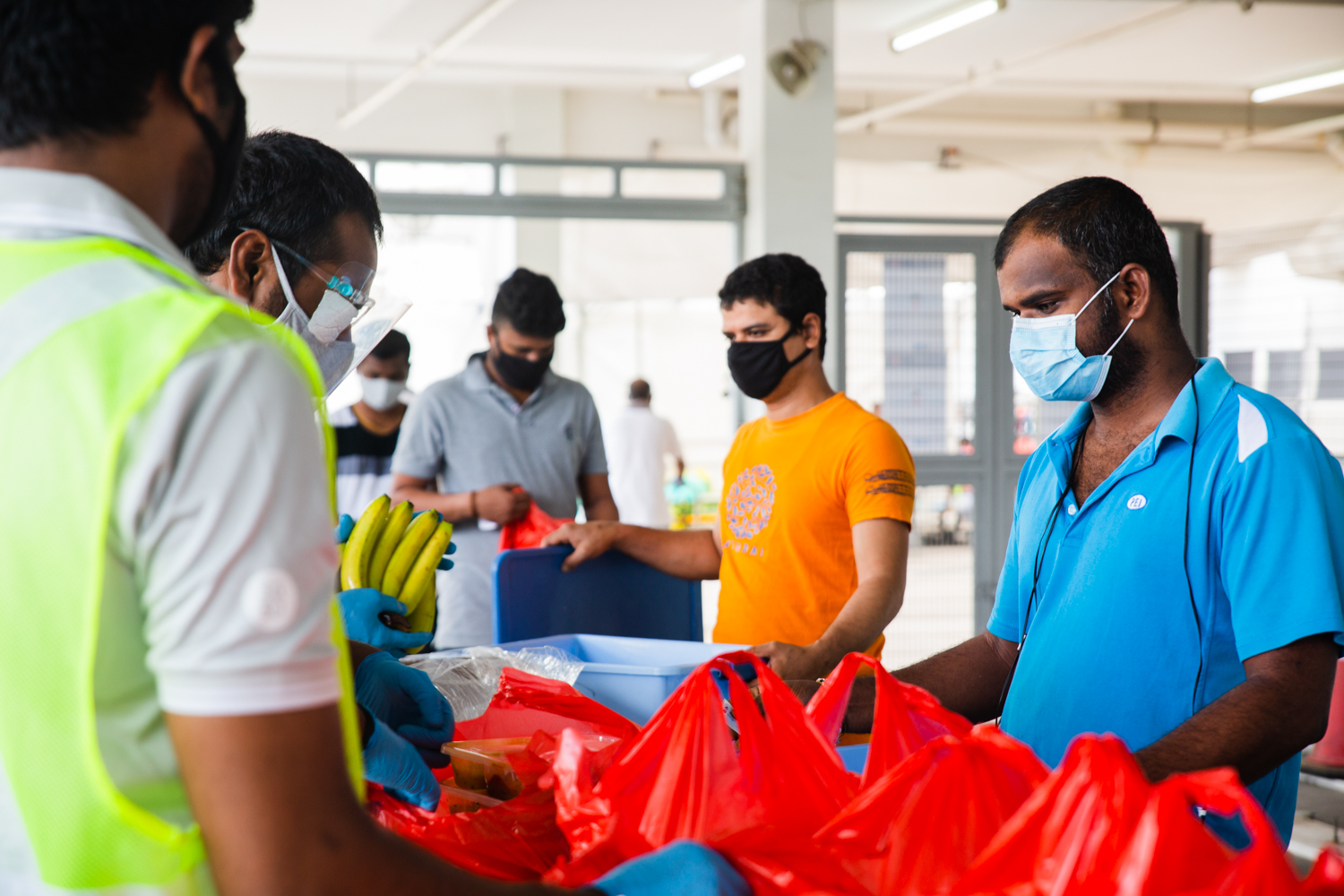 The collection of lunch at ASPRI-Westlite Papan dormitory. Image by Andrew Koay
The collection of lunch at ASPRI-Westlite Papan dormitory. Image by Andrew Koay
“It got better each day, we are enjoying it now,” Suriyanti said before bursting into laughter.
Periodically, the team at Westlite Toh Guan holds small competitions for the residents, to keep morale up.
On April 14 — the day Bengalis, Tamils, Burmese, and Thais celebrated their ethnic new years in 2020 — residents were encouraged to deck a unit representative out in traditional cultural clothes when they were called to collect food. The best dressed were given awards.
“I’m very proud to say lah, until now, you know we are still coping well. (The dormitory staff and the residents) are still greeting each other.
They don’t show any signs of like ‘Oh, I’m so bored to be in the room,’ because they know that we are doing our best.”
"Discouraged and frustrated"
Even over a pixelated Zoom video call, Suriyanti’s positivity was infectious, belying the sacrifices that she and her colleagues have had to make.
Vasudavan, Panneerselvam, and Suriyanti all told me that their working hours have greatly increased since the start of the pandemic.
For Suriyanti, who previously worked office hours, her role in assisting with the ground operations of the isolation has seen her change to two-day shifts.
All three are parents — Vasudavan has six children between the ages of 14 and 26, while Suriyanti has two sons, 16 and 15, and a 10-year-old daughter.
Both, unsurprisingly, feel the worry of spreading the virus to their families weighing on their minds.
Panneerselvam doesn’t carry that same burden, but that’s because his wife and two daughters aged 19 and 15 live in Johor Bahru.
The security executive commuted from Malaysia every day, before the country’s movement control order (MCO) on Mar 18 barred this.
After he’d heard about the border shutting, Panneerselvam initially intended to stay in Malaysia with his family, but a call from Centurion’s management changed his mind, with the commitment of his colleagues cementing his conviction in his revised decision.
“I can’t be away, because my guys are working on site. How can I be at home?” he said to me.
The last time he’d been home was the Monday (Mar 16) before Malaysia’s lockdown came into effect.
The MCO was initially slated to end of Mar 31, and at the time Panneerselvam told his family that he’d see them in two weeks. It now been 11 weeks since he’s been home.
“Now can only video call them, so I do feel helpless without being able to be with my family.
I am unable to be there for family during this period of time, unable to protect them.”
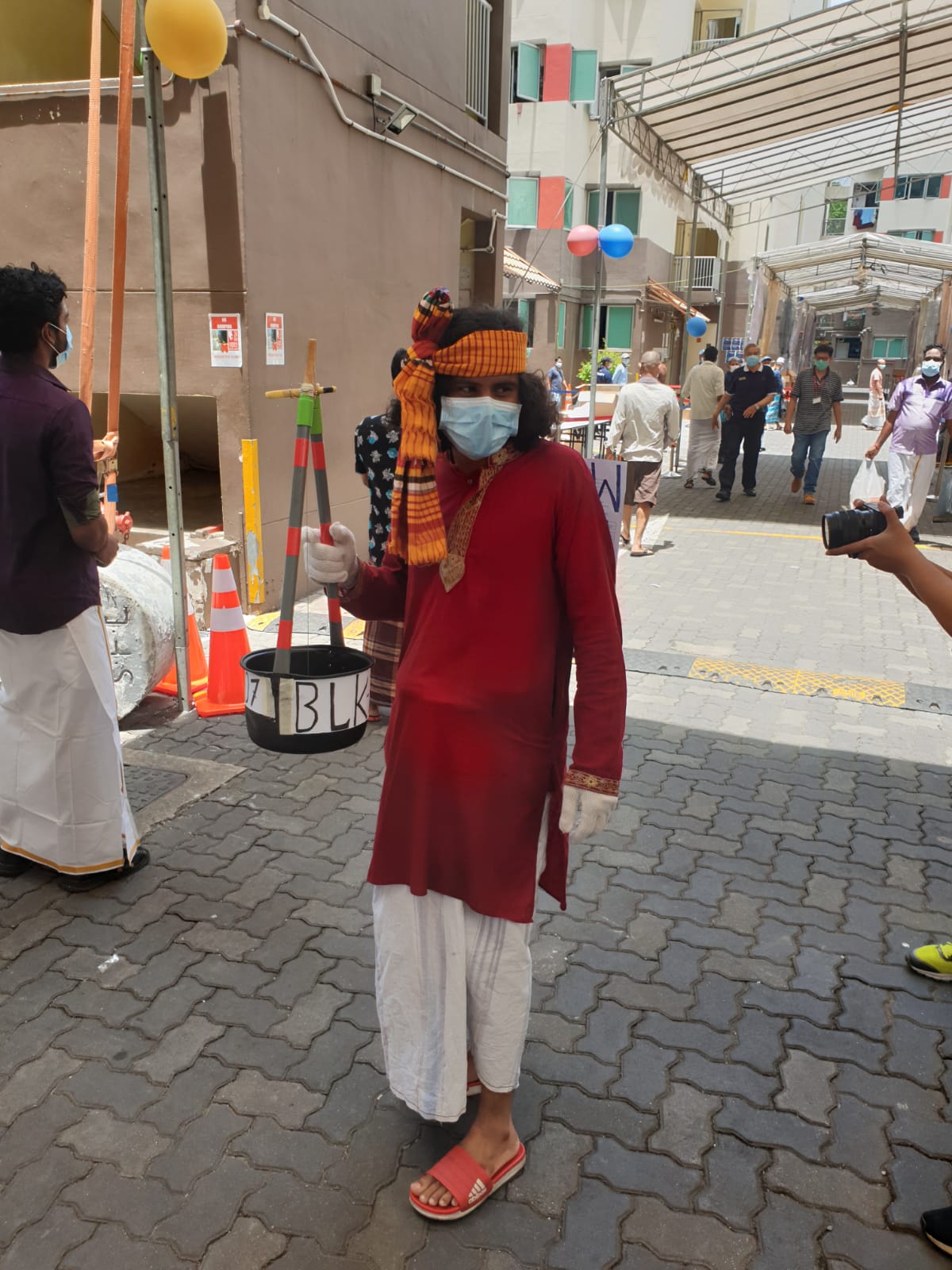 Residents in traditional cultural clothes to celebrate the new year. Image courtesy of Centurion
Residents in traditional cultural clothes to celebrate the new year. Image courtesy of Centurion
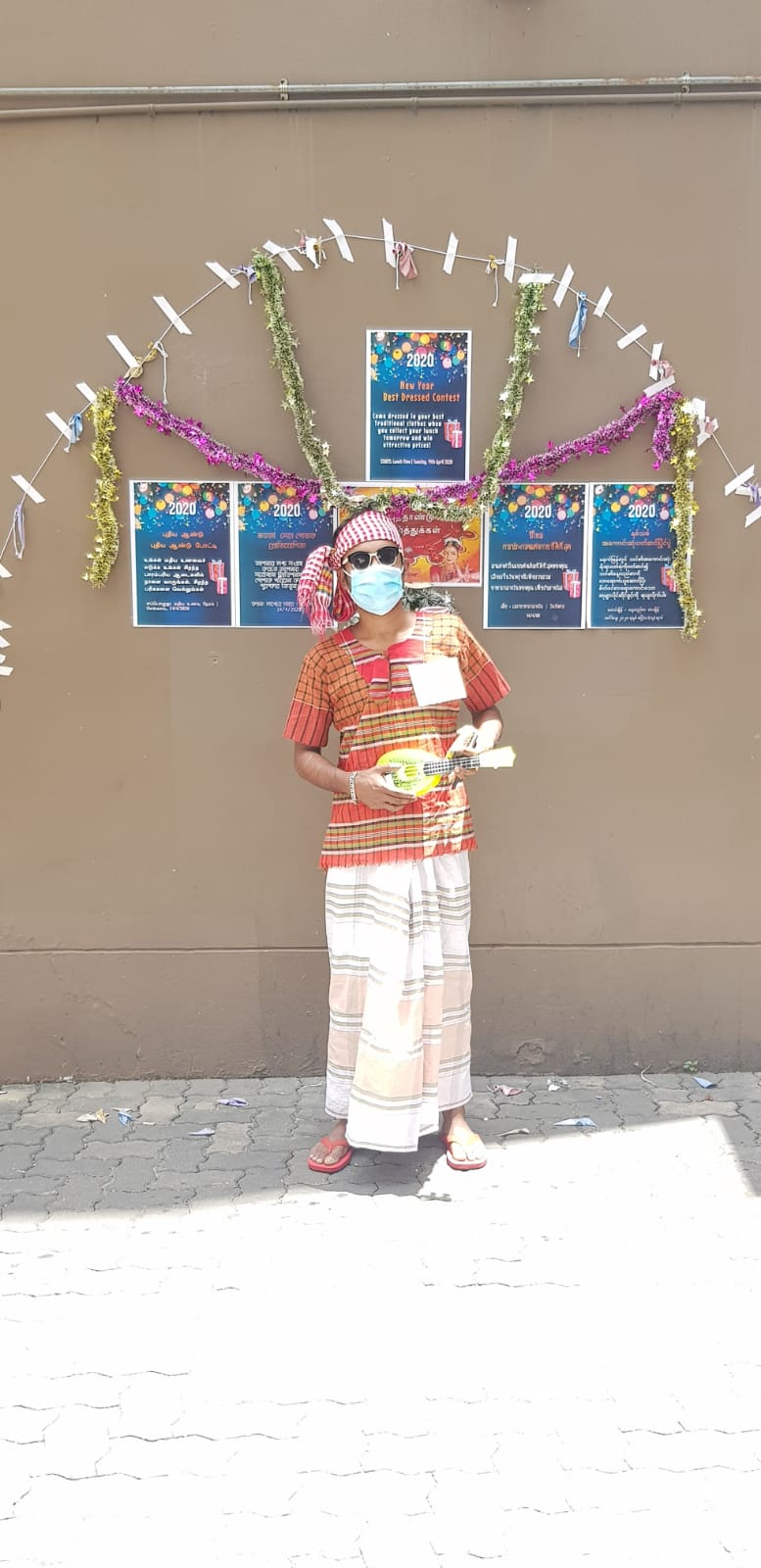 Residents in traditional cultural clothes to celebrate the new year. Image courtesy of Centurion
Residents in traditional cultural clothes to celebrate the new year. Image courtesy of Centurion
For now, Panneerselvam has dedicated himself to protecting the well-being of his residents instead.
“I felt discouraged and frustrated,” he said when I asked about the flak dormitory operators have been getting.
“We are doing our best to protect our residents, and doing much more than recommended.”
Suriyanti told me that while it has been tough dealing with the challenges and negative perceptions of working in a foreign worker dormitory, she is trying to concentrate on doing a good job for the residents.
"Positivity plays a part," she said.
"We cannot give up because more than 5,000 residents need us. We are like their only family in Singapore. We can't give up on them."
Stories of Us is a series about ordinary people in Singapore and the unique ways they’re living their lives. Be it breaking away from conventions, pursuing an atypical passion, or the struggles they are facing, these stories remind us both of our individual uniqueness and our collective humanity.
Top photo by Andrew Koay
If you like what you read, follow us on Facebook, Instagram, Twitter and Telegram to get the latest updates.
